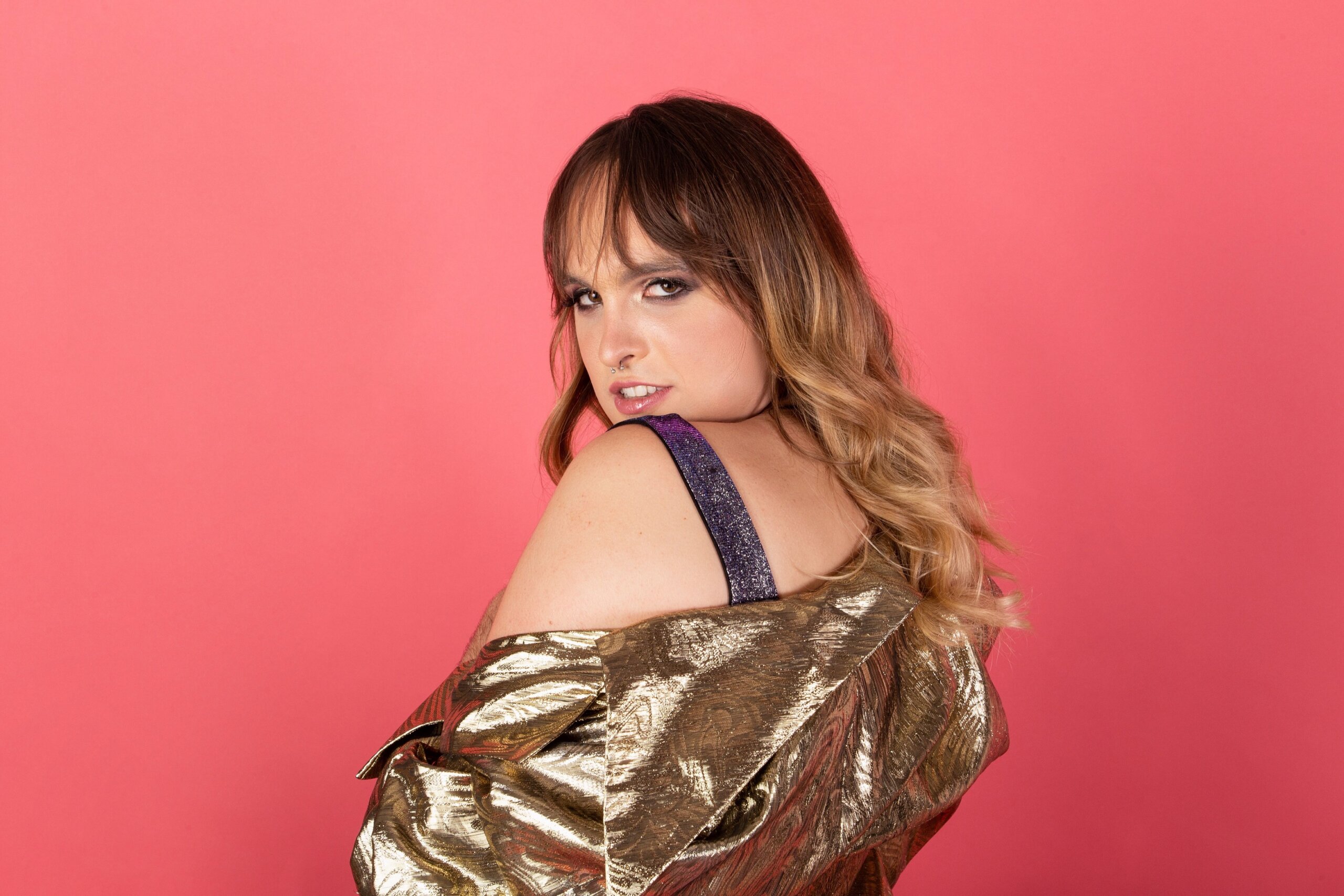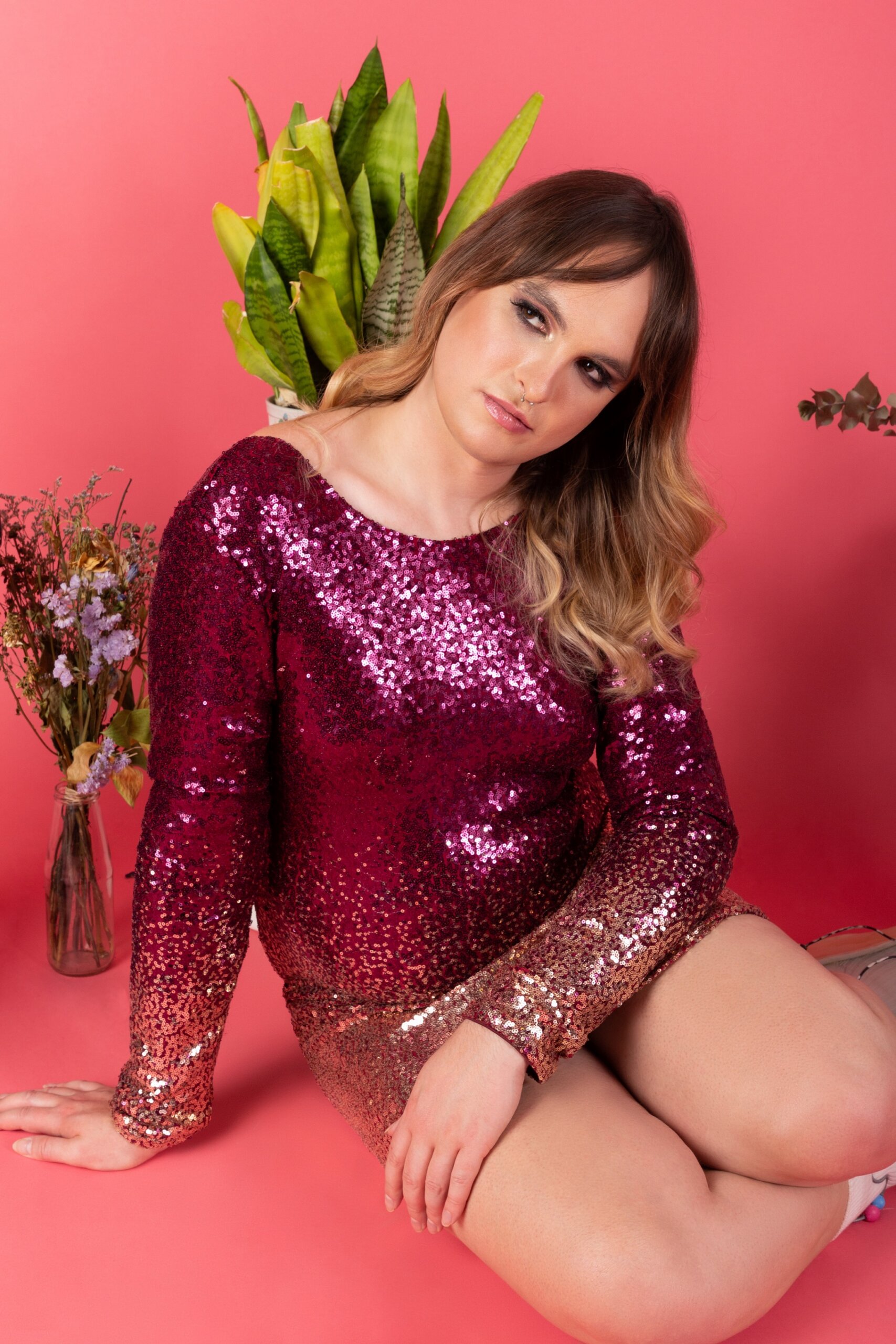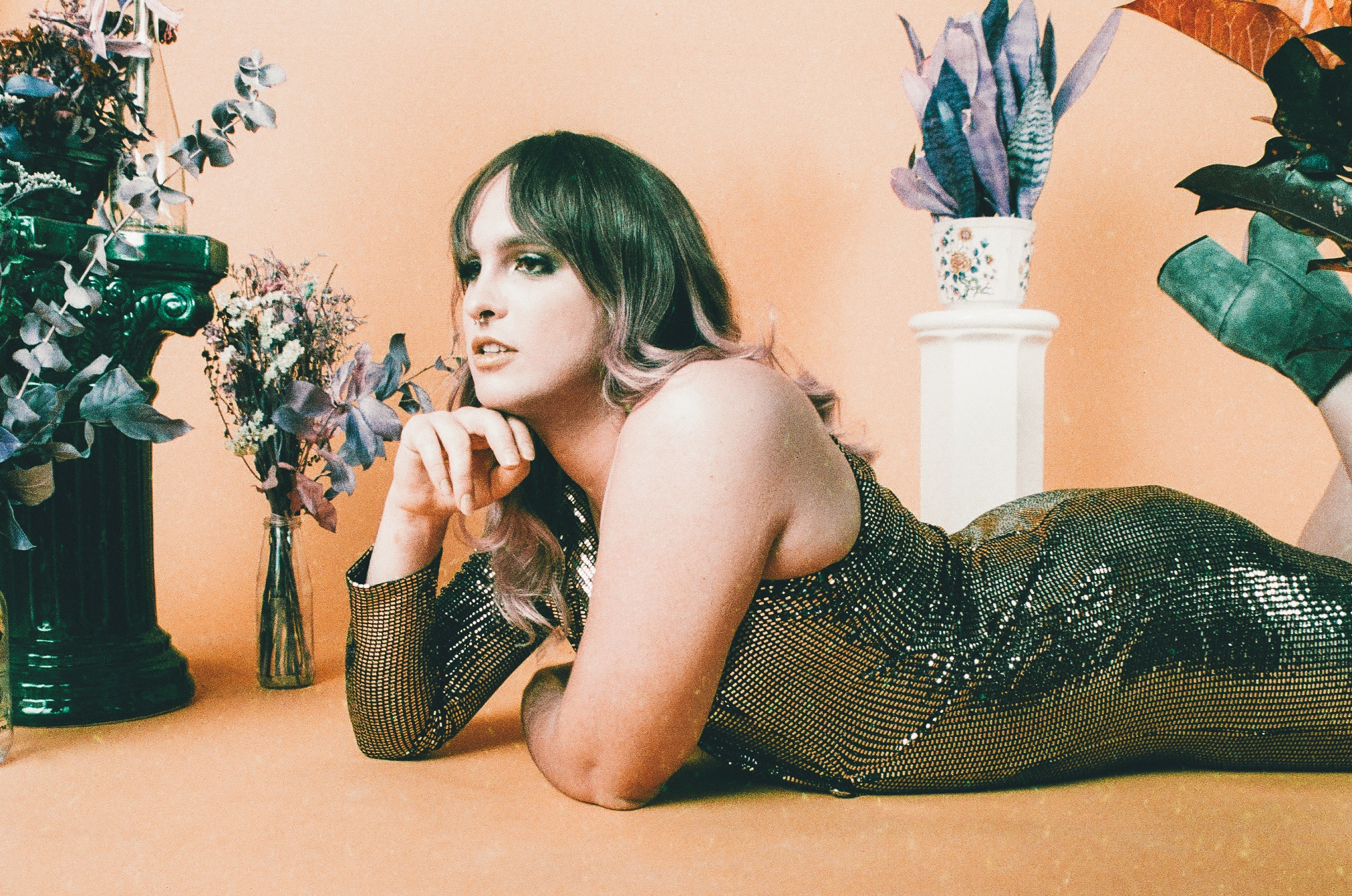It’s a beautiful late-summer evening as I arrive at Eve Parker Finley’s house in Montreal’s Petite Patrie neighbourhood. After Finley invites me into her apartment, I climb up yet another of the city’s pervasive tall staircases with slim little steps. The place in which she lives and works is spacious and sprawling, a single room crowded with artifacts that testify to her life as a millennial creative. The far side of the room, with large windows looking out onto the rooftop patio, functions as a mini studio. A computer desk sits alongside keyboards, mixing equipment, speakers and a ring light, objects that indicate her dual status as both a musician and a comedian.
Finley has been active in Montreal’s music scene since she moved here a decade ago. In the last few years, she’s applied her skills as a multi-instrumentalist to her solo music. Following on the heels of a couple of EPs, her debut album Chrysalia launched at the tail end of 2020; throughout the album’s ethereal, pop-inflected songs, Finley weaves together strings, keys, vocals and saxophone, layering everything seamlessly and artfully. Her latest single, “Icarus,” is a collaboration with friend and fellow musician Ah-Mer-Ah-Su. The electropop banger uses the classic Greek myth, about a character whose wings melt after flying too close to the sun, to speak to the dangers of ignoring community and interdependence.
Eve has worked steadfastly at her career as a musician through the pandemic, which also, fortuitously, opened up different avenues of creativity. Over the last year, Finley has shot to Montreal microcelebrity status through the comedy sketches she’s posted to TikTok and Instagram. The short, bared-down selfie-camera bits that have become immensely popular during the pandemic have been a great outlet for Finley’s creativity and humour. Her sketches, dealing with topics like Montreal culture, life as a trans woman and dating, have been circulated widely through the city and beyond.
As I nosily poke through her apartment, Finley dug through the fridge to produce a couple of mango-flavoured seltzers (the best flavour, fight me). Shepherding me to a gorgeous rooftop patio lined with tomato plants, Eve spoke to Xtra about growing up in a rural Ontario town, social media parasociality and life as a full-time artist.
Where were you before you moved to Montreal? What brought you here?
I’ve lived in Montreal for 10 years this August, wildly. I came here when I was 17. I grew up in a very small town in Ontario called Campbellford, that has a population of about 3,000 people. On paper, I moved to Montreal to go to school at McGill University. But this was also 2011, at the height of indie rock music, which I was really into at the time. I was a 17-year-old listening to Arcade Fire in a small town, thinking, “I want to move to Montreal and move to the Mile End and play music.” That was a big reason why I moved here—and also for the gays. I was so excited to move to a place with queer people.
Were you openly queer when you were growing up?
I came out the summer before grade 12. I remember that because it was right after I was in the student council elections, and it was a controversy because I had been elected as president, and I came back from the summer holidays as the gay president. Then, when I moved to Montreal, I started to experiment with my gender. I had a really terrible performance art or drag persona. Her name was Angel LeCoq. I identified as non-binary for a while, and then I came out as a trans woman.
LeCoq—just like that awful new Quebec chicken chain, Jack le Coq (I know). You were ahead of your time. What was it like being out as queer in such a small town?
I was just talking to my therapist about this recently, because I went back for a family thing. It’s funny because in many ways I did belong to that community before I came out. It’s a very monolithic, very white community, and I also come from a white family that had a place in that community. My family are all musicians, and they ran a music festival. But I definitely felt like a bit of an outsider. I was sort of accepted as a weirdo, an interesting phenomenon. And I still feel that when I go back.

Credit: Stacy Lee
Did you engage with queer culture or other LGBTQ2S+ people over the internet?
While I was visiting my cousin in Alberta, she introduced me to her gay friend. And then we would talk on Facebook about what it was like to be a queer person in the world. Ironically, in Warkworth, the next town over from Campbellford, there’s a huge enclave of retired gays from Toronto. It’s this whole scene.
When Instagram was becoming more of a thing, I remember following these random trans people on Instagram who were from New York or other big cities. I didn’t know them, but I would watch their lives through social media. That was an interesting little taste of representation.
Did those online engagements influence how active you are on Instagram and TikTok today? Have you adopted the role those people played for you?
I think about that a lot. It also makes me think about the people who are seeing what I do over social media. But I can’t think about that too much, because it’s kind of scary to consider the pressure of being a role model. Some of those people I used to follow were problematic, and they weren’t role models.
Do you feel the pressure to be a role model, even though there are now a lot of other LGBTQ2S+ creators on social media?
I remember having a friend who became kind of big on queer Tumblr, and watching her experience people treating her like a role model and reaching out to her in ways that were very intense and stressful and boundary-crossing. It makes me think about navigating that in a way that keeps my own boundaries intact.
How do you deal with parasociality on social media, or the way that a well-known person’s social media followers can view the relationship as more intimate or real than it actually is?
Ever since I’ve started to do things in real life again, I’ve been interacting with people who’ve been watching me online for the past year. I saw an acquaintance the other day and I was like, “I haven’t seen you in so long.” And she said, “I see you every day, so I don’t feel like that.” It’s such a one-way relationship and sometimes people forget that. It’s tough to figure out how to navigate that. But just to remind people that I don’t know what’s going on in their lives, and even if they think they know what’s going on in mine, they don’t, necessarily.

Credit: Stacy Lee
Right, you’re showing a curated version of yourself. Do you ever have people, especially younger LGBTQ2S+ people, looking to you for advice?
It’s happened a few times when I’ve livestreamed, especially on TikTok, where there are many young queer and trans people. I try to navigate that from a place of “I don’t actually know much that will help you.” The only thing that I can provide is the stuff that I like doing for entertainment purposes, and I’m not a counsellor. I’m not even an educator anymore, though I used to be for a number of years. I’m just the busker and the clown.
How did you get into music in the first place?
My parents are both classical musicians, so I grew up in a very musical environment. I started playing violin when I was like three or four, and did the weekly lessons for like 13 years. My parents even run a music festival in a barn on our farm. I’ve performed in the festival, and I’m planning on playing again with my parents and brother, who’s also a musician.
I also grew up singing in a choir, but when my voice changed, like so many people with low voices, I stopped singing because I was embarrassed. It was a whole dysphoria-in-disguise thing. I didn’t want to sing bass or baritone—ever. It’s taken me a long time to get comfortable singing again. But I started taking lessons this year, and I’m finally feeling happy with where my singing is going.
How has your approach to music changed over time, and as you’ve transitioned?
The first music I wrote as a solo person was like bedroom pop songs on guitar. Looking back, I was using them to work through some stuff. This was when I was peak genderqueer and gender-confused. I was writing a bunch of songs about some of the confusion I felt about that. I wrote a song called “Transcendental,” which was my coming-out letter as trans to my parents. The night that I graduated from McGill I sat my parents down, and was like, “I have this song you need to listen to,” and played a recording of it. I cried so much, I was so nervous. Funnily, my dad didn’t hear the lyrics because the mix was so bad. But my mom did and it was really sweet.
I feel like before, writing music was the only form of therapy that I had. And now I actually go to therapy. Music still serves an important function for me that way, but it’s not so raw anymore. If I’m using music to work through something, I don’t like it to be so explicit, which is different from how it used to be.
“I made a little sketch about dating a straight man that was a conversation between me and him at his disgusting apartment.”
After I moved on from bedroom pop songs, I got a looping pedal and became super obsessed with trying to make flute and violin-based music. I was very interested in that because it was fun to layer something, build from something small and make it a big thing. Then I got really into Ableton [a digital audio work station] and producing electronic stuff, and the combination of those two things. Over the last year, I’ve moved into an apartment with piano stuff, and have rediscovered writing music from a piano instead of from loops, and wanting them to be more structured songs with words.
Were your efforts with social media initially for building your profile as a musician?
I downloaded TikTok in March 2020, like a lot of other millennials. It was lockdown and I was bored and seeking entertainment. I spent hours scrolling on it, and became really fascinated with the kind of comedy I was seeing on the app. It felt refreshing and new and interesting. After watching for a few months I was like, “I want to do this.” I had a really bad date with someone and after I got home, I needed to make something about it. I made a little sketch about dating a straight man that was a conversation between me and him at his disgusting apartment. I had so much fun making it, and people thought it was really funny and shared it, and then I kept doing it.
Has building that profile as a comedian helped your music career?
It definitely has. There’s so much pressure on independent musicians to promote their work on social media in a particular way that I never enjoyed doing. I always found it so frustrating and inauthentic. Once I found comedy, it was another form of speaking that is fun and authentic and that brings me joy. And it took me a while, but I’ve started to figure out how it can serve music promotion. One of the things I started doing is taking transphobic troll comments and writing songs from them, which has been a really fun convergence of music and comedy.
The first time I did that, I was working on a song from my next album and didn’t have words for it yet. Often when I’m writing a song I just use “blah blah blah blah” as a placeholder while I’m playing it. I saw a transphobic comment, and wondered how it would fit. It worked and I thought it was so funny, and then I posted it and kept doing it. When I’m writing those songs I’m saying these transphobic lyrics, but I’m laughing so much because I think it’s so funny. It transforms the experience of the troll comment. I was listening to the podcast There Are No Girls on the Internet the other day, and they explained that the function of trolling is so often to police who gets to be on the internet and take up space. And that’s why I try to not let trolling win. But I had to learn ways to deal with it. The trolling also often happens at the same time as you’re being love-bombed by random strangers, so you’re getting a lot of mixed messages.


 Why you can trust Xtra
Why you can trust Xtra


